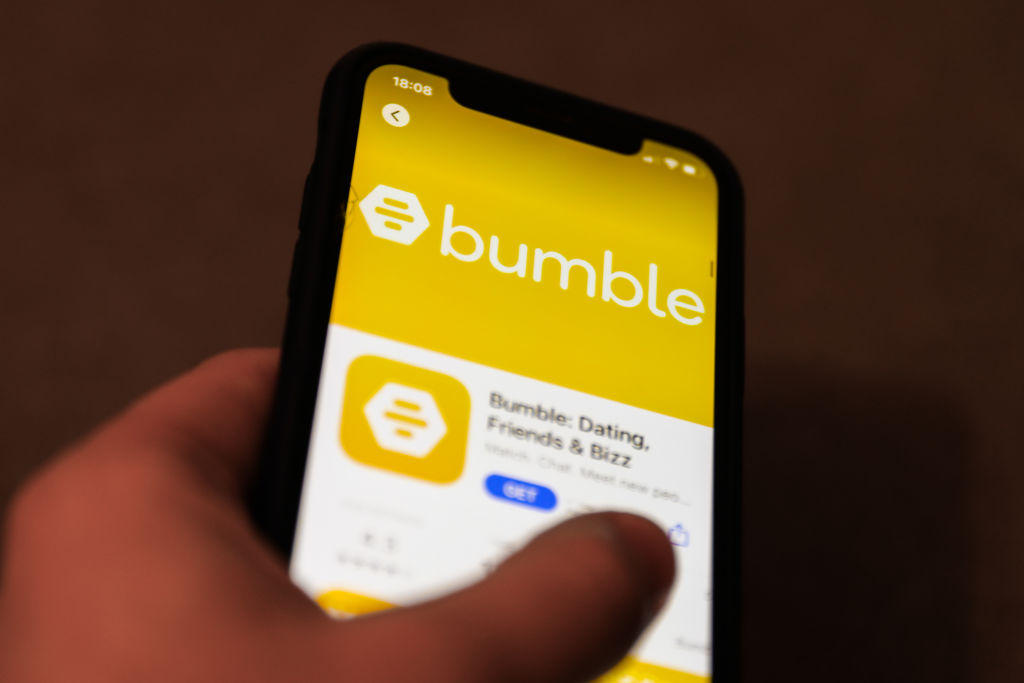Flashing Is a Crime. Sending Unsolicited Nudes Should Be, Too
Bumble and the National Organization for Women are fighting for legislation to make women safer online. Here, they explain exactly how.

Women-led dating and social networking app Bumble carried out a representative study of its community and found that one in three women have been sent unsolicited lewd images, and a whopping 96 percent were unhappy to have received them. This sending of unsolicited nudes, or cyberflashing, is not only violent and pernicious, it’s entirely without consequences in 49 states. Exposing oneself in the street or on the subway could result in an arrest and fine; why shouldn’t doing so over DM, text, or AirDropping carry the same penalties?
As the nation’s largest and oldest advocacy group dedicated to defending women’s rights, the National Organization for Women (NOW) has long fought for justice for survivors of violence. And as an innovator in the digital space, Bumble has been working to upend the culture of misogyny that has allowed for the pervasiveness of online abuse. Combining our organizations’ experience and expertise, we’re teaming up to help make the Internet a safer place for women, not a space where abusers can avoid consequences.
We’ve seen some highly publicized cases of systemic workplace digital harassment. But what about the woman riding the subway who received a lewd image via WiFi from an unknown number, likely a fellow passenger? Is the sense of violation she feels not the same as a woman working for a high-profile company under media scrutiny? Of course, if that passenger flashed the woman in person (the same act, but without the tech), he’d be arrested and probably fined.
Bumble set to work rectifying this disparity in online and offline standards of behavior in 2018. First, we added a layer of protection in the app itself by using artificial intelligence, technology called Private Detector, to blur nude images automatically, allowing the recipient to decide if they want to see them. Then, we started working with legislators in Texas (where the company was founded) on both sides of the aisle. We backed a bill that became law in 2019 following a unanimous vote. Now, the sending of a lewd photo without the recipient’s consent is a Class C misdemeanor in Texas, punishable by a fine of up to $500.
And in January, a bipartisan group of women legislators in Virginia introduced a bill that would make sending sexually explicit photos without permission a civil infraction with penalties of up to $500. After a hard-fought effort, the bill passed unanimously in the Virginia General Assembly last week, and is now with the Governor of Virginia for his signature.

Women-led dating app Bumble backed a Texas bill that means sending a lewd photo without the recipient’s consent is a Class C misdemeanor in that state, punishable by a fine of up to $500.
Similar bills have been introduced in New York, Wisconsin, and California, all with Bumble’s backing. In Wisconsin, two women State Senators introduced two bills in December, one to penalize the sending of unsolicited lewd images online and another to create a civil course of action for survivors of “stealthing,” a common form of sexual assault in which someone removes or tampers with a contraceptive or other form of protection. Both bills are currently in committee.
In February, the FLASH (Forbid Lewd Activity and Sexual Harassment) Act passed California’s State Senate with strong bipartisan support; it’s now headed to the Assembly. If it passes this summer, the FLASH Act would create an infraction—punishable by $500 for the first offense, and $1,000 thereafter—for sharing sexually explicit materal without the recipient’s consent. In New York, a bill that’d establish the unsolicited disclosure of an intimate image as a crime was introduced to the State Senate in January; it’s expected to go to the vote this spring.
Stay In The Know
Get exclusive access to fashion and beauty trends, hot-off-the-press celebrity news, and more.
Research suggests that abusive behavior online has intensified in the last few years, and there’s no question it’s gendered. Between 2017 and 2020, the percentage of U.S. adults experiencing severe abuse on the Internet rose from 15 percent to 25 percent, according to the Pew Research Center. Among adults who reported having been harassed online, about half (47 percent) of women said the abuse was related to their gender, while just 18 percent of men said the same. There’s already evidence suggesting that gender-based violence surged since this research was published—both online and off. For women, the specter of real-world violence looms, even on the Internet: A fifth said their digital abuse included threats of physical harm.
Crimes conducted online are just the beginning of a dangerous cycle of abuse and harassment.
Payton Iheme and Christian Nunes
These statistics paint an extreme view of the gaps in online safety, but for women of color, these numbers are significantly higher. As two Black women leaders at Bumble and NOW respectively, we’re especially attuned to the scourge of Internet abuse: The Pew research also shows that about half Black (54 percent) or Hispanic (47 percent) survivors of harassment say they were targeted due to their race or ethnicity, compared with 17 percent of white people. LGBTQ+ folks are also more likely to face digital attacks: roughly 70 percent have encountered harassment online, versus about 40 percent of straight adults.
Crimes conducted online are just the beginning of a dangerous cycle of abuse and harassment. This is why Bumble and NOW are calling on legislators in every state to help us break the chain of violence against women by introducing bills to prohibit the sending of unsolicited nudes, using the Texas legislation as a blueprint. We’ll continue to work with a broad range of advocacy groups and lawmakers in all parties in the course of these efforts; protecting women from abuse, online or off, shouldn’t be considered a partisan issue. The world, and by extension the Internet, isn’t safe for women, but it’s worse for those living at intersections of identity. As we spend more time than ever before online, we have to act to protect the most marginalized and vulnerable from violence.
If you’d like to help Bumble and NOW see that cyberflashing is criminalized in every U.S. state, contact your local representatives.
Payton Iheme is Bumble’s Head of Public Policy for the Americas and is lending her expertise
to focus on issues across community building, online safety, diversity and equity, data
privacy, the digital economy, small business, and public/private partnerships.
Christian F. Nunes, MBA, MS, LCSW, became NOW president in August 2020. She was
previously appointed Vice President by the board in May 2019. As the second African
American president in the organization’s history, Nunes is leading the organization through an
intersectional lens, bringing a diverse coalition of grassroots activists to work against
structural sexism and racism.
-
 Celebrities Are All Trading Sweats for La Ligne's Colby Pants
Celebrities Are All Trading Sweats for La Ligne's Colby PantsOnce I pulled them on, I understood the hype.
By Halie LeSavage Published
-
 Sézane, Zara and Reformation Take the Lead in Princess Beatrice and Princess Eugenie’s F1 Grand Prix Fashion
Sézane, Zara and Reformation Take the Lead in Princess Beatrice and Princess Eugenie’s F1 Grand Prix FashionThe York sisters revved up their spring style in Bahrain.
By Kristin Contino Published
-
 Prince Harry Allegedly Offered "Olive Branch" to Kate and William
Prince Harry Allegedly Offered "Olive Branch" to Kate and WilliamThe Duke of Sussex's decision was reportedly an effort "to make peace."
By Amy Mackelden Published